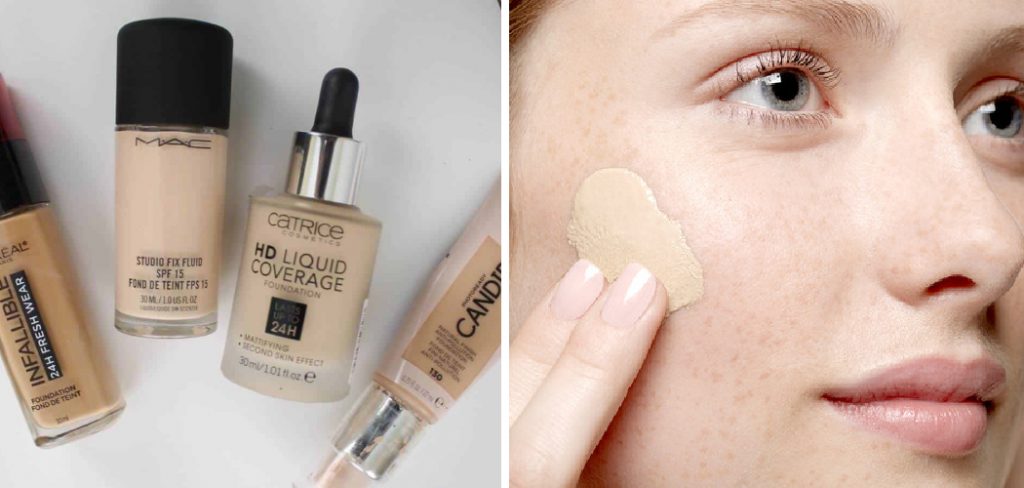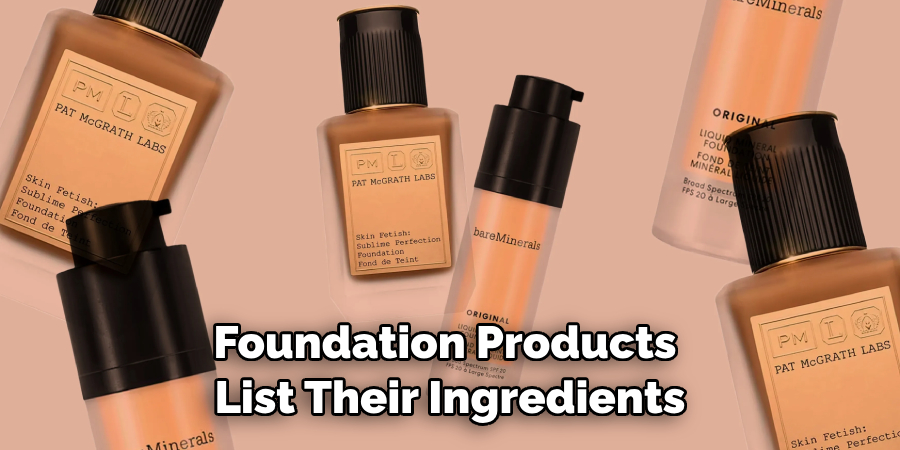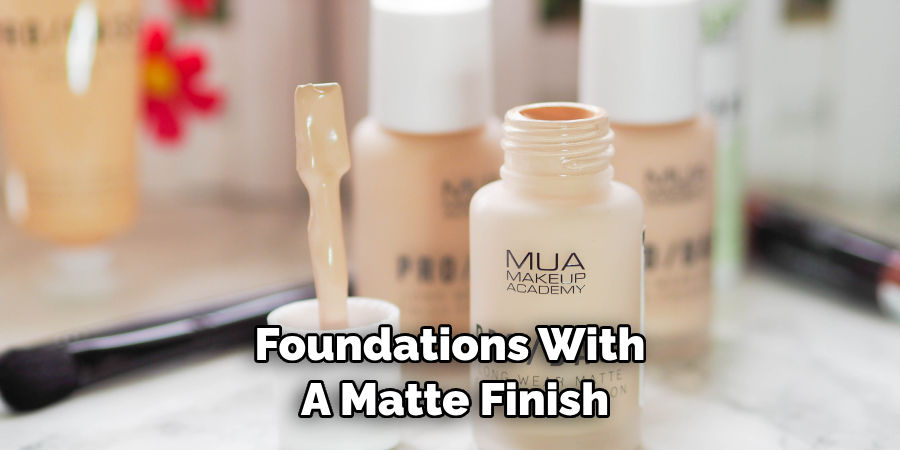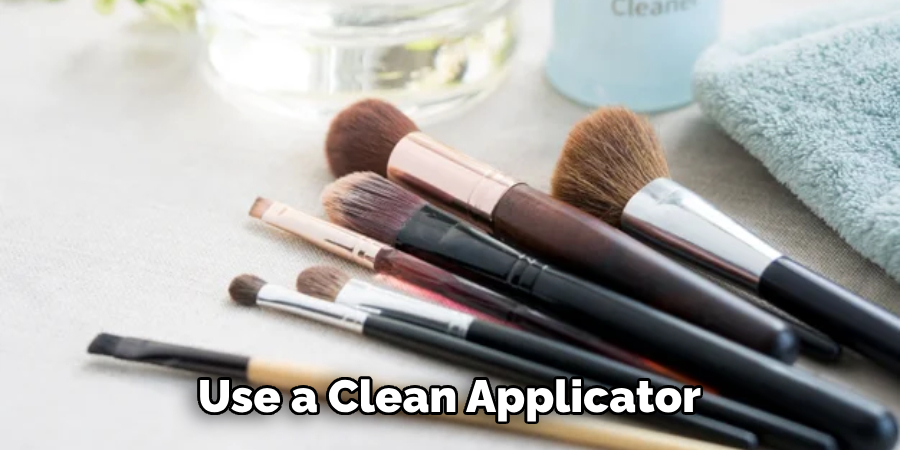Are you interested in learning how to know if foundation is water based? Knowing when makeup is made from water-based ingredients can help you make sure your skin stays healthy and happy. Water-based foundations don’t clog pores like their oil-based counterparts, so they provide additional comfort and wearability. Here, we will explore the differences between water and oil based foundations, the benefits of using a water based foundation, and some tips on how to know if your foundation is truly water based. Keep reading for more insights!

If you want to achieve a flawless makeup look, it’s important to choose foundation that works with your skin type. Knowing whether or not your foundation is water based is key to making sure your makeup looks its best for as long as possible. Water-based foundations are especially beneficial for those who have oily or acne prone skin because they don’t contain any heavy oils that could clog pores and lead to breakouts. Keep reading for easy ways to determine if the foundation that you’re using is water-based so you can make sure your makeup stays looking fresh all day.
Benefits of Water Based Foundation
1. Easy To Blend
One of the great things about a water-based foundation is that it’s easy to blend. That means you don’t have to spend hours trying to get your foundation even and blended in with the rest of your makeup. You can apply it quickly, and then blend it out for a perfect finish.
2. Natural-looking Finish
Water-based foundations are lightweight and often contain sheer pigments, which means that they give your skin a natural-looking finish. This is perfect if you don’t want to look like you’re wearing a lot of makeup or if you want more subtle coverage.
3. Good for Sensitive Skin
Water-based foundations are usually made with fewer chemicals, making them a great option for those with sensitive skin. They are also hydrating and can help reduce the appearance of redness or dryness.
4. Loads of Options

The best part about water-based foundations is that there are so many different types available, from sheer to full coverage, matte to dewy, and drugstore to high-end. This means that you can find the perfect foundation for your skin type and needs.
5. To Get Longer Wear Time
Water-based foundations are also great for extending the wear time of your makeup. Many water-based formulas contain silicones, which help them adhere to the skin and stay put all day long.
In conclusion, water-based foundations are a great choice for anyone looking for lightweight coverage with a natural finish. They are also easy to blend and often contain fewer irritating ingredients, making them suitable for those with sensitive skin. Plus, with so many different types of water-based foundations available, you can find the perfect one for your needs.
12 Ways How to Know If Foundation is Water Based
1. Check the Label
The first step in determining if a foundation is water-based is to check the label. Many foundation products list their ingredients on the packaging, so you can quickly look up if water or another water-based ingredient (such as glycerin) is included.
2. Read Reviews
Checking online reviews can be useful in determining whether a product is water-based or not. If you find that many reviewers have said a product is water-based, then you can take their word for it. Also you have to make sure that the reviews are reliable.
3. Ask a Professional
Visiting a beauty store and asking an experienced makeup artist or someone from the brand can also help you find out if a foundation is water-based or not. They will be able to provide more information on the product than what’s listed on the package.

4. Check the Consistency
If the foundation has a thin and liquid consistency, this may indicate that it is water-based. A thicker texture usually means an oil-based product. But make sure to double-check with the label and reviews for more accuracy.
5. Test the Foundation on Your Skin
Another way to determine if a foundation is water-based is to apply a small amount of it on your skin and monitor the results. Generally, water-based foundations will provide light coverage that feels comfortable and cooling on the skin.
6. Watch Out for Slippage
If you notice that the foundation starts to slide off your skin after a few hours, it’s likely an oil-based product. Water-based foundations have better staying power and don’t move around as much.
7. Look for Matte Finish
Foundations with a matte finish are typically water-based and provide a more natural look. Oil-based foundations offer more of a dewy finish, which can be too shiny for some people. You will have to make sure to find the right finish for your skin type.
8. Consider the Environment
If you live in a hot and humid climate, opting for a water-based foundation may be the best choice since it will help keep your skin cool and comfortable. Oil-based foundations can make you feel greasy and cause breakouts in these conditions.

9. Investigate the Ingredients
Checking what is in a foundation can help you determine if it’s water-based or not. Look for ingredients such as water, glycerin, and propylene glycol which are all commonly used in water-based foundations.
10. Talk to Your Friends
If you have friends who use makeup, ask them about their experience with the product. This can give you a better idea of how it performs and if it is water-based or not. This can help you make a more informed decision before buying.
11. See How It Spreads
When testing out a foundation on your skin, observe how it spreads across your face. If you notice that it has an even finish without any patchiness, it may be a water-based foundation. Make sure to spread it evenly and let it dry for a few minutes before judging.
12. Check How Long It Lasts
Water-based foundations are usually known to last longer than their oil-based counterparts. If you notice that your foundation stays on all day without fading or creasing, then you can assume it’s water-based.
Frequently Asked Questions
What Precautions Should I Take When Applying Water-Based Foundation?

When applying a water-based foundation, it is important to take several precautions. First, you should make sure that the area you are applying the foundation on is clean and free of any dirt or oil build-up. Secondly, use only a small amount of product—too much can cause your skin to become too oily or clog your pores. Finally, make sure to wash your hands thoroughly before and after applying the foundation, as it is easy for bacteria and other micro-organisms to transfer from your hands onto your skin.
Can Water-Based Foundations Cause Breakouts?
Although water-based foundations do not cause breakouts in itself, they can exacerbate existing skin conditions if not applied properly. For example, if you use too much product or apply it incorrectly (for example, applying too little to certain areas), this can cause a build-up that could block pores and lead to breakouts. To avoid this, make sure to stick to the recommended amount of foundation for your skin type and take extra care when applying the foundation.
What Ingredients Make a Foundation Water-Based?
The main ingredient that makes a foundation water-based is usually water. However other ingredients such as glycerin or propylene glycol may also be used to give it a smoother texture. Additionally, preservatives and emulsifiers that help keep the foundation from separating are often used as well. In order to find out if a specific foundation is water-based, it is important to check the label for any of these ingredients.
Can I Make My Own Water-Based Foundation?
It is possible to make your own water-based foundation at home, however, you should exercise caution when doing so. You should use only the highest quality ingredients, as some products may not be safe for skin contact. Additionally, you should ensure that you follow all safety protocols and instructions for mixing, storing, and applying the foundation. When in doubt, it is always best to consult a professional before attempting to make your own water-based foundation.
Is Water-Based Foundation Better for My Skin?
Water-based foundation is generally considered to be better for your skin than other types of foundation, such as oil-based or powder-based formulas. This is because water-based foundations are less likely to clog pores and cause breakouts, and it also helps to keep your skin looking hydrated and healthy. Additionally, it is easier to apply and can provide better coverage than other types of foundations. However, ultimately, the best foundation for your skin will depend on your individual needs, so be sure to consult a dermatologist or makeup artist before picking out the right foundation for you.
How Much Water-Based Foundation Should I Use?
The amount of foundation you should use depends on your skin type and the coverage you are looking for. In general, using a pea-sized amount is enough to cover your face. However, if you need more coverage, it is okay to add a bit more product. Just be sure not to overdo it, as too much foundation can look cakey and accentuate imperfections. Additionally, you should always make sure to blend the foundation out well for a natural-looking finish.

Can I Reapply Water-Based Foundation Throughout the Day?
Yes, it is possible to reapply water-based foundation throughout the day if needed. However, you should be careful not to overdo it, as this could potentially lead to clogged pores or breakouts. Additionally, be sure to use a clean applicator each time you reapply the foundation so that you don’t transfer bacteria onto your skin.
Overall, water-based foundations are a great option for those who want to keep their skin looking healthy and hydrated. Just be sure to select a product that is right for your skin type, use the recommended amount, and apply it carefully and correctly. Additionally, it is important to remember to never share makeup or applicators with anyone else in order to protect against bacteria transfer.
Conclusion
Knowing whether a foundation is water based or not can be helpful when determining if it matches your needs and lifestyle. While trying to figure out which type is best for you, be sure to read the ingredients list on the back of the box and get familiar with what signs suggest that the product is oil-based. Keep your skin type in mind as well, since water-based foundations are best used on normal to combination skin. On the other hand, those with dryer and more mature skin tones may find better results from oil-based foundations because they offer a bit more moisture.
Now you know how to know if foundation is water based! Experimenting with both types can also help you decide which one works best for you — so don’t hesitate to try them both out until you find the perfect match! With these things in mind, it’s easy to make an informed decision about which type of foundation is right for you.
About the Author
Jane Hubbard is a passionate beauty expert with a wealth of experience in makeup, hair, and overall beauty techniques. After years of working as a hairdresser specialist, she followed her entrepreneurial spirit and started her own consultancy business.
Jane has always been driven by her desire to help others feel confident in their own skin, and she does this by sharing her knowledge, experiences, and practical beauty tips. Through her consultancy, she empowers individuals to embrace their unique beauty, offering tailored guidance that boosts both self-esteem and personal style.
Professional Focus
- Specializes in makeup, hairstyling, and beauty consulting.
- Provides personalized beauty advice, tips, and techniques to help individuals feel confident in their appearance.
- Dedicated to staying up-to-date with the latest industry trends and developments.
- Passionate about creating a comfortable and empowering experience for every client.
Education History
- University of Craft and Design – Bachelor of Fine Arts (BFA) in Woodworking and Furniture Design
- Woodworking Apprenticeships – Extensive hands-on training with skilled craftsmen to refine carpentry and furniture making techniques
- Online Courses & Masterclasses – Continued education in advanced woodworking techniques, design principles, and specialized tools
Expertise:
- Makeup artistry, hairstyling, and beauty consulting.
- Personalized beauty techniques to enhance confidence and self-expression.
- Educating clients on how to maintain their beauty routines at home.
